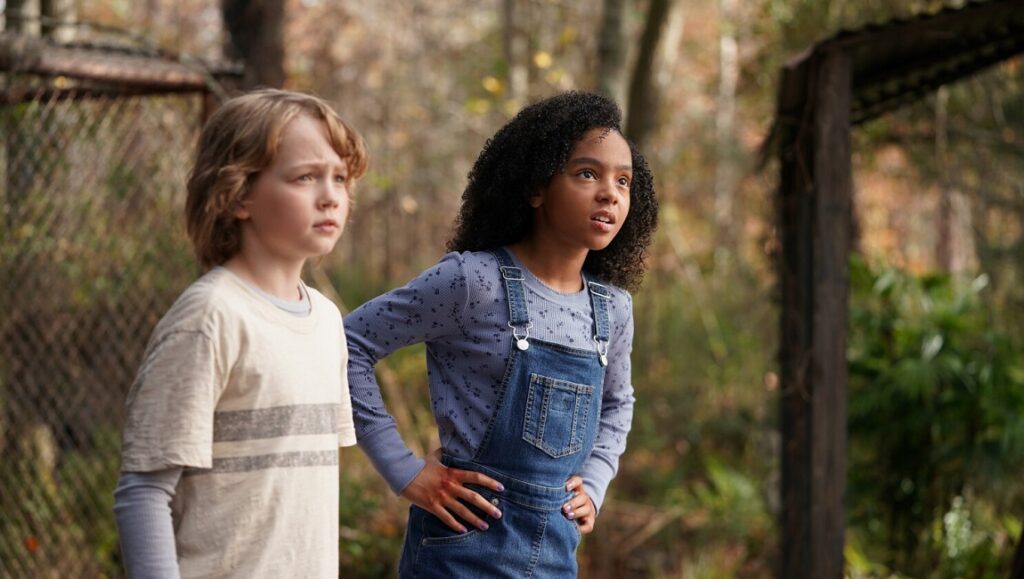The Tiger Rising falls flat on its face.
Despite a title that would seem to suggest some kind of magic-tinged narrative, The Tiger Rising is not another low-rent, knockoff fantasy property, but is instead a low-rent, knockoff Florida Project. That, plus the controversies of non-payment of crew that have dogged the film in the two-and-change years since production wrapped, and it feels safe to say that The Tiger Rising will remain one of the year’s more dubious releases across the rest of 2022. Based on the National Book Award-nominated children’s book by acclaimed youth novelist Kate DiCamillo, Ray Giarratana’s film adaptation bears none of that prestige, instead wallowing in its own cheap grime and woeful production quality. Pitched to the archest possible degree and littered with childhood poverty-isms, the film concerns a young rash-riddled boy named Rob who lives in a “stupid hick town with stupid hick people,” where the relative trash factor of Floridians is hotly debated, and where the script throws in a few instances of rancid grammar just in case viewers weren’t yet clued in to demo the film’s working with. The put-upon youth is of course bullied, by the sort of anonymous preteen thugs who think the way to welcome a new student is to chase her across a playground (but only until the bell rings, which they unequivocally respect), and he of course lives in a scuzzy motel with his dad after the recent death of his mother, in a bit of j-fic miserablism. “Just till we get back on our feet,” he tells new friend Sistine (Madalen Mills), a Black girl who is new in town and has a chip on her shoulder regarding the podunk populous — a fair stance to take, though it would go down smoother if Mills, previously so charming in the unfairly overlooked Jingle Jangle, wasn’t seemingly coached to operate on the register of roid rage.
Okay, so with a duo of underdog rugrats in place, what about the tiger? Rob finds the creature caged in the woods behind his motel, and so he frequently visits him because he finds it affords him some fleeting inner peace, for nebulous reasons. He also shows the wild animal to Sistine, and she has opinions on his living conditions. That’s about it re: the tiger. The rest of the Nickelodeon-style dramatics involve scenes like one where Rob freaks out that Sistine accidentally peeped his tighty-whities. Dennis Quaid does pop up as Beauchamp, the motel and tiger’s owner, giving a performance that seems entirely fueled by coke — delivering the only perkiness in the movie — but which, being a children’s film, we’ll just assume is his particular take on kids flick villainy. The triangulation of these limited story beats results in an awkward narrative that alternately blunders and fast-forwards its way to some inevitable places and predictable tragedy, but with little to actually say about anything. Flashback sequences of Rob’s mother do little to elucidate either him or his father’s psychology beyond their archetypes of soft dweeb and sadsack dad, and there’s absolutely no rhetoric — or even moralizing, really — concerning the captivity of wild animals or the pervasive amorality of culture’s broad human-centric thinking, other than Rob and Sistine observations that he should be free. A couple of Einsteins, these two. There’s barely even acknowledgement that the tiger is something altogether different than a dog or a mule, so uninterested is the film in any consideration of the brutal beauty of nature or our ethical responsibility to the granularity of animal psychology. It’s as unimaginative and perfunctory as adaptations come, and indeed the utter ineptitude of The Tiger Rising at every level is enough to fairly chalk the film up to sheer laziness, but then there are the inexplicable low angles with which scenes are so frequently shot, which means someone here was at least making decisions. None of them turned out to be good ones, however, and The Tiger Rising stands out only for how it makes bland derivation seem like something to aspire to. All that’s left to chew on at film’s end is whether it was crueler to put that gorgeous tiger in a cage or in this film.
Published as part of Before We Vanish | January 2022.


Comments are closed.